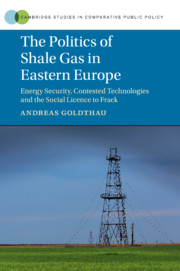 The Politics of Shale Gas in Eastern Europe
The Politics of Shale Gas in Eastern Europe Book contents
- The Politics of Shale Gas in Eastern Europe
- Cambridge Studies in Comparative Public Policy
- The Politics of Shale Gas in Eastern Europe
- Copyright page
- Contents
- Figures
- Tables
- Acknowledgements
- Abbreviations
- 1 Introduction
- 2 The Policy Context
- 3 The Analytical Context
- 4 The Stalling Front Runner: Poland
- 5 The Naysayer: Bulgaria
- 6 A No with Options: Romania
- 7 The Comparative Public Policy of Shale Gas in Eastern Europe
- 8 Conclusion
- Appendix
- References
- Index
7 - The Comparative Public Policy of Shale Gas in Eastern Europe
Published online by Cambridge University Press: 21 April 2018
- The Politics of Shale Gas in Eastern Europe
- Cambridge Studies in Comparative Public Policy
- The Politics of Shale Gas in Eastern Europe
- Copyright page
- Contents
- Figures
- Tables
- Acknowledgements
- Abbreviations
- 1 Introduction
- 2 The Policy Context
- 3 The Analytical Context
- 4 The Stalling Front Runner: Poland
- 5 The Naysayer: Bulgaria
- 6 A No with Options: Romania
- 7 The Comparative Public Policy of Shale Gas in Eastern Europe
- 8 Conclusion
- Appendix
- References
- Index
Summary
- Type
- Chapter
- Information
- The Politics of Shale Gas in Eastern EuropeEnergy Security, Contested Technologies and the Social Licence to Frack, pp. 139 - 149Publisher: Cambridge University PressPrint publication year: 2018


